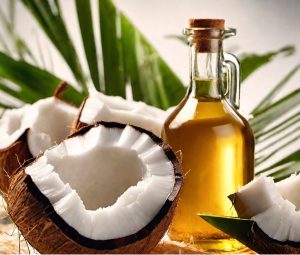Unlocking the Power of Coconut Oil
Let’s take a moment. Think about the myriad uses of that coconut oil sitting in your kitchen. Cooking, skincare, maybe even as a hair mask. But here’s a curveball – it might be the key to tackling that nail fungus issue. Yep, that same jar is packing more than just culinary might.
The Unexpected Battle with Nail Fungus
Isn’t nail fungus just the worst? You might be living your life, minding your own business, and bam! Those nails start looking a tad off-color. And you wonder, “Where did this come from?” Trust me, it’s a sneaky issue, and the annoyance it brings? Totally get it.

So, Why Coconut Oil? Seriously?
Yes, seriously. It’s all about the lauric acid in coconut oil. This amazing component transforms into monolaurin when it meets our skin. Now, I won’t bore you with the science-y details, but monolaurin is like kryptonite to harmful bacteria, viruses, and, yep, fungi.
Big Pharma vs. Mother Nature
It’s a weird human thing – we tend to believe that if something’s not in a shiny, pricey package, it can’t be as good. But sometimes, the simple stuff, the natural stuff, works wonders. And coconut oil? It’s one of nature’s little wonders.
Here’s How You Do It
Start Clean
First off, give those feet a good wash. Warm water, a bit of soap, and a thorough dry, especially between those toes.
The Good Stuff
Now, go for the gold – and by gold, I mean virgin, organic coconut oil.
Get it On
Scoop a bit out, and rub it gently over that pesky nail. If you can, get a little underneath too.
Stick With It
I know, I know, it’s a process. But try to rub in the oil twice a day, maybe while listening to your favorite song or podcast episode.
Give It Time
Rome wasn’t built in a day, and nail fungus won’t disappear overnight. But trust the process and be patient.
Stop It Before It Starts
Preventing fungus in the first place? Now that’s where it’s at. A dab of coconut oil on your nails every day, some clean and airy shoes, and ensuring your feet aren’t constantly in a damp environment can work wonders.
And If It’s Not Your Jam?
Hey, we’re all different. Maybe coconut oil won’t be the magical cure for you. And that’s okay. There are loads of other natural remedies out there. Just make sure to chat with a doctor or specialist before diving into something new.
Last Thoughts
Look, I’m not saying coconut oil will solve all your problems. But when it comes to nail fungus, it’s worth a shot. So the next time you’re whipping up dinner and reach for that jar, remember it’s not just a tasty ingredient – it’s a tiny nail warrior, waiting in the wings. Cheers to that!
| Compound Name | Short Description | References |
|---|---|---|
| Lauric Acid | Has antimicrobial properties and can help fight infections | [1][2] |
| Caprylic Acid | Has antifungal properties and can help treat yeast infections | [1][2] |
| Capric Acid | Has antimicrobial properties and can help fight infections | [1][2] |
| Myristic Acid | Has anti-inflammatory properties and can help reduce inflammation | [1] |
| Palmitic Acid | Has antioxidant properties and can help protect against oxidative stress | [1] |
| Oleic Acid | Has anti-inflammatory properties and can help reduce inflammation | [1] |
| Linoleic Acid | Can help improve skin health and reduce inflammation | [1] |
| Stearic Acid | Has moisturizing properties and can help hydrate the skin | [1] |
| Vitamin E | Has antioxidant properties and can help protect against oxidative stress | [1] |
| Polyphenols | Have antioxidant properties and can help protect against oxidative stress | [1] |
References:
– [1] Fatty Acids and Derivatives as Antimicrobial Agents – PMC – NCBI
– [2] Treatment of Dermal Infections With Topical Coconut Oil | Natural Medicine Journal





Leave a Reply